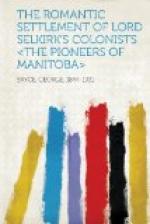THE INDIANS OF THE RED RIVER.
No man knew the Indian better than Andrew McDermott. No one knew better how to trade and dicker with the red man of the prairie. He could tell of all the feuds of tribe with tribe, and of the wonderful skill of the Fur Companies in keeping order among the Indian bands. The Red River had not, after the departure of the French, been visited by travellers for well nigh forty years. No doubt bands of Indians had threaded the waterways, and carried their furs in one year to Pigeon River, on Lake Superior, or to Fort Churchill, or York Factory on Hudson Bay. It was only some ten or fifteen years before the coming of the Selkirk Colonists that the fur traders, though they for forty years had been ascending the Saskatchewan, had visited Red River at all. No missionary had up to the coming of the Colonists ever appeared on the banks of the Red River. Some ten years before the settler’s advent, the fur traders on the upper Red River had most bitter rivalries and for two or three years the fire water—the Indian’s curse—flowed like a flood. The danger appealed to the traders, and from a policy of mere self-protection they had decided to give out no strong drink, unless it might be a slight allowance at Christmas and New Year’s time. Red River was now the central meeting place of four of the great Indian Nations. The Red Pipestone Quarry down in the land of the Dakotas, and the Roches Percees, on the upper Souris River, in the land of the wild Assiniboines were sacred shrines. At intervals all the Indian natives met at these spots, buried for the time being their weapons, and lived in peace. But Red River, and the country—eastward to the Lake of the Woods—was really the “marches” where battles and conflicts continually prevailed. Red River, the Miskouesipi, or Blood Red River of the Chippewas and Crees, was said to have thus received its name. Andrew McDermott knew all the Indians as they drew near with curiosity, to see the settlers and to speculate upon the object of their coming. The Indian despises the man who uses the hoe, and when the Colonists sought thus to gain a sustenance from the fertile soil of the field, they were laughed at by the Indians who caught the French word “Jardiniers,” or gardeners, and applied it to them.




